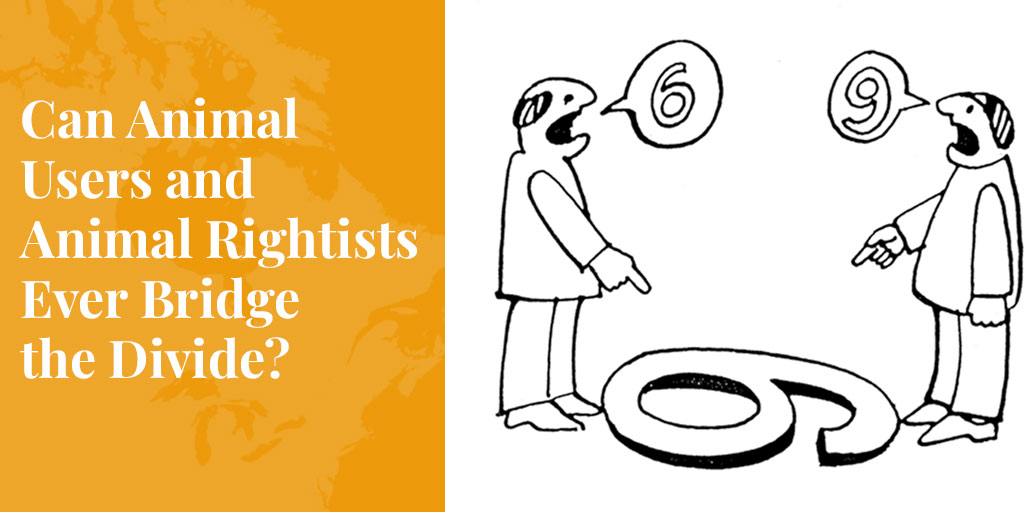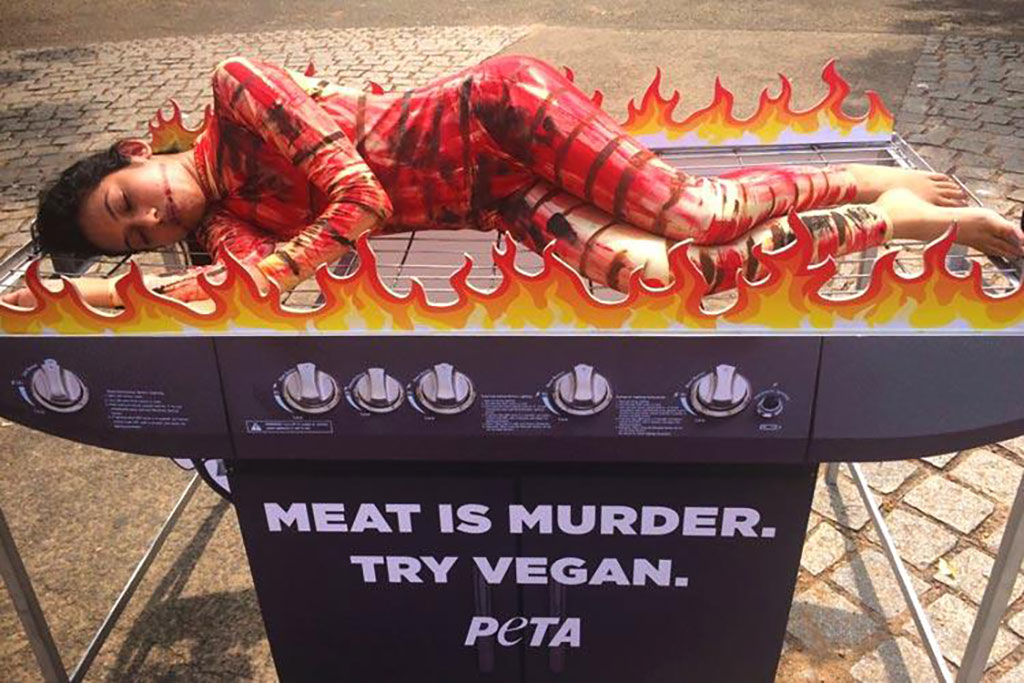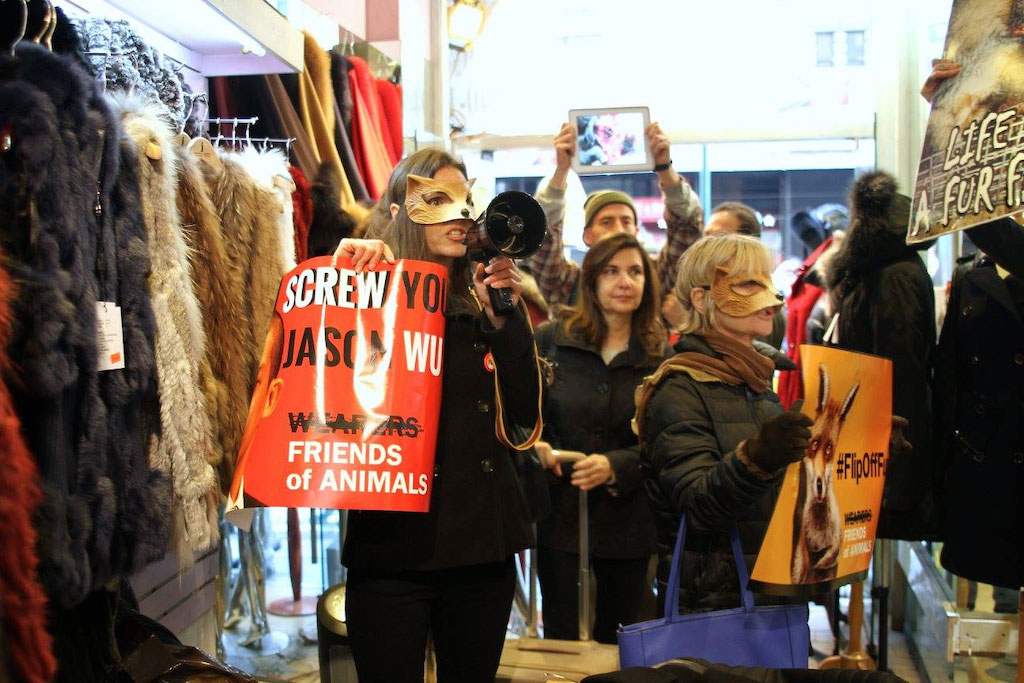
Differences of opinion, and the debates they spawn in search of amicable solutions, are crucial to the functioning and evolution of democratic society. But even the healthiest of democracies can’t please all of the people all of the time, so we aspire to keep the majority as happy as possible while defending the rights of minorities to follow different paths. This approach breaks down, however, when a minority refuses to accept the will of the majority. Such is the quandary Western society faces today in dealing with animal rightists.
Though far fewer of us now work directly with animals than in the past, almost all of us still eat and wear animal products, and benefit from medicines and medical procedures tested on animals, to name just three of the most important ways in which animals benefit humans. But animal rightists want all of these banned, while some even oppose non-lethal uses, like pets and seeing-eye dogs. Can a path of peaceful coexistence be found? Or will we be forever locking horns?
Essential Freedoms
Two essential freedoms are at play here, freedom of speech and freedom of choice, with the latter being a manifestation of the former. Freedom of speech enables us to express our views, while freedom of choice enables us to act on them. The problem is that while the animal rights movement embraces its own right to freedom of speech, it rejects the right of others to freedom of choice.
In fact, animal rightists push their freedom of speech to the legal limit and beyond, denouncing animal users as “murderers” and “torturers”. In so doing, they regularly make statements that any court would find slanderous or libelous if animal users had the time and money to file suit.
What they refuse to accept is the freedom of choice of others, a vital freedom in any functioning democracy that is easy to understand and should be easy to apply. In short, we are free to do whatever we want, provided it is legal. It doesn’t mean we have to like the things some people do, just as they don’t have to like the things we do.
Thus, for decades now, animal users have been saying to animal rightists: “If you choose not to eat meat, fine. If you choose not to wear leather or fur, fine. If you choose not to save your life’ with medicines tested on animals, fine. But please respect our freedom to choose for ourselves.”
But this simple and democratic way to avoid conflict is soundly rejected.
“Meat Is Murder”

So why is the animal rights movement so opposed to freedom of choice? In general terms, it’s because the movement’s moral code differs from that of most people. That’s why it is often likened to a religion, since religions tend to have moral codes that are somewhat unique. It has also been likened to an intolerant religion, whose mission it is to convert non-believers.
More specifically, it’s because the animal rights philosophy teaches that the intentional killing of an animal by a human is murder. Murder is a universal taboo (except for the obvious difference that most people think it refers only to humans killing humans), so we can all appreciate to some degree why animal rightists refuse to compromise on this one. Morally speaking, numbers are not the issue, since murdering one human (or animal) is no more defensible than murdering 1,000. And there are no half measures. You can’t partially kill an animal, and even if you kill it humanely, it’s still dead.
Activists for most other causes can be pragmatic, and are open to improvements wherever they can be found. For example, environmental activists don’t demand that we quit driving, just that we drive less or switch to electric cars. They ask us to use less plastic, not stop using it altogether. And they don’t ask us to sit in darkness, just to use more energy-efficient light bulbs.
But animal rights activists don’t have this luxury. If Americans were to reduce the number of chickens they “murder” each year from 9 billion to just one, that would still be one too many.
Creating Conflict

Given that animal rightists see no room to negotiate with animal users, and outright reject their freedom of choice, they have opted instead to focus on creating conflict. For example, animal rights groups pioneered an anti-social tactic (now dubbed “naming and shaming”) based on a simple formula: find someone doing something you don’t like, take photos or video, then publicly shame the person into changing their ways.
This tactic is not intrinsically bad. Sometimes a situation may seem so desperate that naming and shaming can feel like the only course of action left. Witness the huge outpouring of support for Greta Thunberg, the Swedish teenager (born 2003) now blaming every adult on Earth for a climate crisis that her generation will pay for. You may not agree with her, but if you’re worried about leaving the fate of the planet in the hands of politicians and big business, you understand why she’s doing it.
But shaming people to bow to your will, or forcing them to do so by legal means, should only be encouraged as a last resort. Why? Because it creates ill will, even hatred, and irreparable divisions.
To cite one of countless examples, California lawmakers have just passed bans on all commercial and recreational trapping and the manufacturing and selling of fur products. It is no secret that they were driven to do so by the animal rights lobby, who shamelessly fed lawmakers every lie and half-truth they could dream up to win their case. But when the dust settles, things will not just return to normal, with everyone getting along in a spirit of civic harmony. Quite the opposite. While the victorious animal rights lobby steamrolls on to its next target, trappers, furriers, freedom-of-choice advocates, and a host of other sympathisers, will forever remember how livelihoods and traditions were destroyed to satisfy the demands of a few. The animal rights movement may have “saved” a few animals, but it has surely gained thousands of new enemies in the process.
Rise of Veganism

So what’s to be done? Can animal rightists be persuaded to become “team players”, working together with animal users in pursuit of a more harmonious society?
Right now, the answer is probably no. In North America at least, there are more supporters of animal rights now than ever before, though presumably few of the new converts signed up for a life on the road, donning balaclavas by night to steal farm animals or ransack research labs.
Most probably came to animal rights after adopting a vegan lifestyle for a variety of reasons, typically some vague notion of health benefits or saving the planet. They then learned along the way that the philosophy behind animal rights and veganism is essentially the same. Now that veganism is better understood, all new converts have probably at least questioned the morality of killing animals, while so-called “militant vegans” are synonymous with animal rights activists.
Whatever the case, organisations of any type – be they a business, a religion, or a knitting circle – are less open to change when the numbers are up.
But here’s the rub. Although vegans are now a common sight in major cities and on college campuses, it seems highly unlikely they will ever constitute more than a small percentage of the overall population. It’s not easy to gather reliable data on eating habits, but according to a recent assessment of multiple surveys, self-identifying vegans now account for between 1% and 2% of the US population. In other words, if they hope to convert us all to their way of life, they’re facing an impossible task.
Animal rightists-cum-vegans thus face a choice. Will they settle for sowing conflict and division until the end of time? Or will they find a way to co-exist peacefully with others?
Moving Forward

If I had the opportunity for a one-on-one with Ingrid Newkirk, founder of People for the Ethical Treatment of Animals and grande dame of the animal rights movement, I would begin by stating the following truths. (i) Most people will never agree with PETA’s views on animal use, so you are fighting a lost cause. (ii) PETA is all about being negative, insulting people at every turn and never saying anything nice. All stick and no carrot. (iii) While PETA is undeniably a master at grabbing headlines, most people are sick to death of reading them.
Given this negative scorecard, I would then suggest that the animal rights movement change tack. Here are some specific actions it could take today to help it become a useful participant in the democratic process.
• Above all, show integrity. Following are some examples of how.
• Don’t tell lies, don’t fabricate evidence, and if someone sends you alleged evidence of animal cruelty, ensure it is real before publishing it.
• If you find you have inadvertently published false information, don’t pretend you don’t know. Remove it immediately, and maybe even issue a public apology.
• If you obtain evidence of animal cruelty, don’t sit on it waiting for the best time to use it for fundraising. Share it with authorities at once so they can investigate.
• When publishing video of animal cruelty, make unedited footage available as well, with audio, to allay suspicions that it has been edited to create a false impression, or even worse, has been staged.
• Don’t engage in, or condone, illegal activities like releasing animals from farms or vandalism.
• Don’t expose children to shocking images. The next time you hold a street demo, ditch the photos of animal cruelty and hand out samples of vegan cooking instead.
• If you must target stores, do so at a distance, and never harass customers, scrawl graffiti, scream abuse, superglue locks, or take your demo inside the store. In case you haven’t realised it yet, everyone hates you when you take your demos indoors.
• Don’t bombard people on social media with hateful messages, and never, ever send death threats.
• Put animal rights on the back burner, and pursue improvements in animal welfare instead. They may not be entirely on message for your group, but they’re achievable, and if you’re up front about your intentions, you’ll have broad support. But don’t be dishonest and push for higher animal welfare standards as a ruse to drive animal users out of business.
And if you’re up for making these much-needed changes, try thinking outside the box to come up with campaigns that respect freedom of choice, and may even turn enemies into friends. Call me a hippy, but how about hosting vegan food-tasting events, and extending friendly invites to your local ranchers and hunters? Or go the whole hog and invite them to set up their BBQs too, then have a contest. Or organise vegan fashion shows but invite designers using real leather and fur too, then let the audience choose which they prefer.
Democracy is about building bridges, but all you’re currently doing is burning them. Are you ready to change?
***
To learn more about donating to Truth About Fur, click here.











I love all your points in “Moving Forward”. Thank you for addressing the issues with how PETA operates.